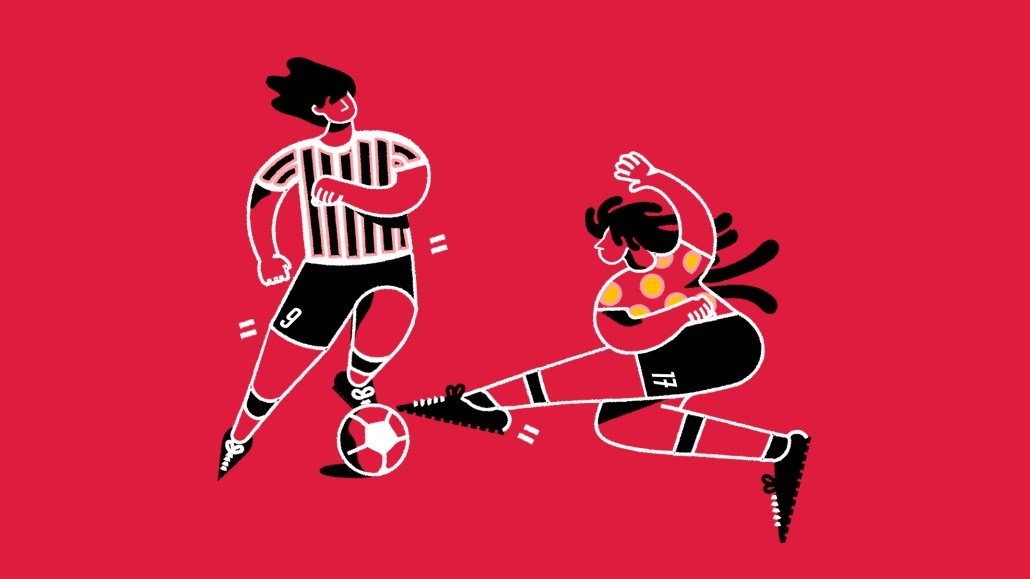Save 50% on a 3-month Digiday+ membership. Ends Dec 5.

As brands look to integrate themselves more deeply into esports games, “Rocket League” is becoming an increasingly attractive marketing channel thanks to its parallels with traditional sports.
In the past, “Rocket League” — a wildly popular game in which players use virtual cars to knock a ball into an opposing team’s goal — has brought brands in-game by allowing players to pilot real vehicles, as well as through virtual pitch-side banners at the game’s competitive championships, which broke a viewership record at last month’s World Championship.
Now, the game has expanded its in-game marketing inventory even further by using the surfaces of its virtual vehicles as advertisements. Between August 24 and September 5, “Rocket League” players could download limited-edition Puma-branded decals and wheels matching the real-life kits of football clubs sponsored by the sportswear brand, including AC Milan, Borussia Dortmund, Manchester City, and Olympique de Marseille. The decals feature Puma’s logo prominently, and are among the first “Rocket League” in-game decals to include a consumer goods brand’s logo in this way.
Puma representatives declined to specify exactly how much Puma spent on last month’s “Rocket League” activation. “Rocket League’s” available inventory includes vehicle decals, field-side banners and other in-game items.
The partnership got started when “Rocket League” developer Epic Games approached AC Milan about a potential collaboration. AC Milan brought the idea to Puma — and the sportswear brand, which views the metaverse as a commercial opportunity on the level of e-commerce, was immediately interested.
“‘Rocket League’ is one of those games that is targeting the right audience for us, and also for AC Milan, so it was a quite natural integration,” said Puma head of global football partnerships Josele Angulo.
Puma and its partners at Rebel Ventures, the cultural fandom agency that designed and executed the activation, are confident in the marketing power of “Rocket League” because they see the game as a crossover point between traditional sports and esports fandom. Like more traditional sports games such as “EA FC,” “Rocket League” is relatively popular among sports fans.
“‘Rocket League is a game that every CMO can understand — it’s rocket-powered race cars playing soccer,” said Chris Mann, svp of the agency Rev/XP. “Viewership is always on the rise; it’s fun, it sells out arenas globally.”
But Puma is arguably even more enthusiastic about its integration into “Rocket League” than it is about any traditional sports game marketing efforts. “Rocket League’s” Unreal-Engine-powered science fiction environment allows brands to activate in-game in ways that would be incongruous for sports games rooted in real-life pursuits like football or basketball.
“It brings traditional sports to life in a completely unexpected and unique way,” said Rebel Ventures CEO Craig Howe. “So ‘Rocket League’ is very different, in this sense, and what I think Puma has done really well is try to create integration assets that benefit the gamer as much as they fit within the sporting universe.”
Moving forward, additional football clubs, such as Manchester City, are preparing to enter “Rocket League,” according to Angulo. Although Angulo declined to share any specific ROI figures, he said that the brand is tracking in-game metrics such as the number of miles driven and goals scored by vehicles using Puma-branded decals.
So far, Puma is satisfied with the numbers it’s been getting from Epic Games.
“The beauty of this activation was that we are reaching a different type of consumer, that we will never be able to reach only with Puma, only with the clubs,” Angulo said. “This is what brings something totally new, kind of merging these three worlds. And I think that’s amazing.”
More in Marketing

Ulta, Best Buy and Adidas dominate AI holiday shopping mentions
The brands that are seeing the biggest boost from this shift in consumer behavior are some of the biggest retailers.

U.K. retailer Boots leads brand efforts to invest in ad creative’s data layer
For media dollars to make an impact, brands need ad creative that actually hits. More CMOs are investing in pre- and post-flight measurement.
Ad position: web_bfu




